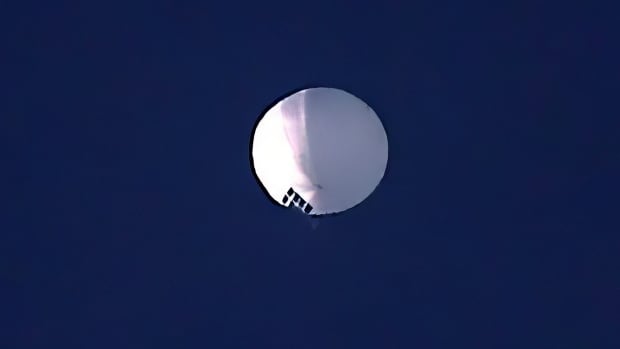Opposition parties say the public deserves answers about a Chinese balloon’s incursion over Canadian territory as the Trudeau government remains largely mum about its time in Canada.
That call for answers came Monday as the commander of the North American Aerospace Defence Command revealed that “gaps” in the continent’s early warning system prevented officials from detecting such balloons in the past.
Defence Minister Anita Anand has confirmed the balloon violated Canadian airspace, but the government has otherwise declined to provide details about when and where the balloon flew in Canada, as well as whether there have been others.
That stands in contrast to Washington, which has provided details about the balloon’s flight from Alaska through Canada and into the continental U.S., before it was shot down off the coast of South Carolina on Sunday.
“The Pentagon and the White House have been a lot more open in discussing what happened,” Conservative defence critic James Bezan said. “As a country that had its airspace violated by the Communist Party of China, we deserve answers.”
Opposition parties also want to know why the public didn’t find out about the balloon until it had already left Canadian airspace, why it wasn’t stopped sooner, and what steps are being taken to prevent and punish Chinese espionage efforts.
“It is high time the government took action to counter Chinese influence and modernize Canada’s defence systems,” Bloc Quebecois defence critic Christine Normandin said in a statement in French.
“In addition to this, light must be shed on this event and the government must offer answers to the population as to the impact of this spy balloon.”
The ‘domain awareness gap’
The U.S. military first confirmed the balloon’s presence after it was publicly reported over Montana on Feb. 1. U.S. Defense Secretary Lloyd Austin later revealed that it was first detected entering American airspace in Alaska on Jan. 28.
While Beijing says it was a weather research balloon that was blown off course, Ottawa and Washington are alleging that it was being used to spy on sensitive military sites.
NORAD commander U.S. Gen. Glen VanHerck told reporters that such balloons evaded detection by North America’s aging early warning system in the past because of a “domain awareness gap” that has since been closed.
“So there was a potential opportunity for us to collect intel where we had gaps on prior balloons,” he said. “This gave us the opportunity to assess what they were actually doing, what kind of capabilities existed on the balloon.”
White House National Security Council spokesman John Kirby told reporters on Monday that the U.S. military has begun collecting debris from the balloon.
Unanswered questions
NDP Leader Jagmeet Singh said Canada should be part of any investigation into the wreckage.
“People are rightfully worried that Canada’s economic and security advantages may be compromised,” Singh said in a statement. “Canada should be playing an active role in investigating the purpose of the craft and pinpointing any intelligence it gathered.”
Anand’s office has not responded to repeated questions about when the balloon entered Canadian airspace from Alaska, or how long it remained in Canada before re-entering the U.S. over Idaho. It also hasn’t said whether there were other balloons.
Defence Department spokesman Daniel Le Bouthillier would only say that after finding the balloon did not pose a threat, Canadian and U.S. officials decided to reveal the balloon’s presence “at an appropriate time, taking into account operational security.”
Bezan acknowledged Canada’s partnership with the U.S. when it comes to defending North America, but said Canadians have a right to know what’s happening in their country.
“It did seem that it was positioning itself over various military installations within the United States,” he added, noting that Alberta is home to major Canadian military bases at Cold Lake, Edmonton and Wainwright.
“What Canadian secrets were potentially spied on by the communist regime when they were flying over our airspace?”
VanHerck has said the U.S. “took maximum precautions” to prevent the balloon from collecting information as it crossed the nation. He refused to provide details.
U.S. officials have said the balloon was 60 metres tall, and the sensor payload underneath was the size of a regional jetliner. They have also said it had propellers and a rudder to change direction and speed but relied mostly on the winds.
Kirby also dismissed China’s contention that the balloon was for meteorological purposes, saying “it strains credulity that this was some kind of weather balloon that was floating on the winds.”
The White House said the balloon was a setback to already tense relations with Beijing. Secretary of State Antony Blinken was supposed to visit China on Monday, but the trip was put on hold because of the incident.


